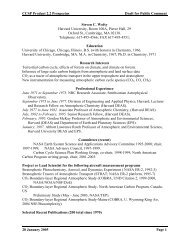Decision support experiments and evaluations using seasonal to ...
Decision support experiments and evaluations using seasonal to ...
Decision support experiments and evaluations using seasonal to ...
You also want an ePaper? Increase the reach of your titles
YUMPU automatically turns print PDFs into web optimized ePapers that Google loves.
tion patterns. There are concerns that multiple<br />
isl<strong>and</strong>s would be inundated in a “10-year s<strong>to</strong>rm<br />
event”, which represents extreme local vulnerability<br />
<strong>to</strong> flooding.<br />
In the central delta, there are five county governments<br />
in addition <strong>to</strong> multiple federal <strong>and</strong><br />
state agencies <strong>and</strong> non-governmental organizations<br />
whose perspectives need <strong>to</strong> be integrated<br />
in<strong>to</strong> the management process, which is one of<br />
the purposes of the CALFED program. A key<br />
decision being faced is whether delta interests<br />
should invest in trying <strong>to</strong> build up <strong>and</strong> repair<br />
levies <strong>to</strong> protect subsided soils. What are the<br />
implications for other isl<strong>and</strong>s when one isl<strong>and</strong><br />
floods? Knowing the likelihood of sea-level<br />
rise of various magnitudes will significantly<br />
constrain the answers <strong>to</strong> these questions. For<br />
example, if the rise is greater than one foot<br />
in the next 50 <strong>to</strong> 100 years, that could end the<br />
debate about whether <strong>to</strong> use levee improvements<br />
<strong>to</strong> further protect these isl<strong>and</strong>s. Smaller<br />
amounts of sea-level rise will make this decision<br />
less clear-cut. Answers are needed in order <strong>to</strong><br />
<strong>support</strong> decisions about the delta in the near<br />
term.<br />
Implementation/Application<br />
Hundreds of millions of dollars of res<strong>to</strong>ration<br />
work has been done in the delta <strong>and</strong> associated<br />
watersheds, <strong>and</strong> more investment is required.<br />
Where should money be invested for effective<br />
long-term impact? There is a need <strong>to</strong> invest in<br />
res<strong>to</strong>ring l<strong>and</strong>s at intertidal <strong>and</strong> higher elevations<br />
so that wetl<strong>and</strong>s can evolve uphill while<br />
tracking rising sea level (estuarine progression).<br />
Protecting only “critical” delta isl<strong>and</strong>s (those<br />
with major existing infrastructure) <strong>to</strong> endure a<br />
100-year flood will cost around $2.6 billion.<br />
Another way that climate change-related information<br />
is critical <strong>to</strong> delta management is in<br />
estimating volumes <strong>and</strong> timing of runoff from<br />
the Sierra Nevada mountain range (Knowles<br />
et al., 2006). To the extent that snowpack will<br />
be diminished <strong>and</strong> snowmelt runoff occurs<br />
earlier, there are implications for flood control,<br />
water supply <strong>and</strong> conveyance, <strong>and</strong> seawater<br />
intrusion—all of which affect habitat <strong>and</strong> l<strong>and</strong><br />
use decisions. One possible approach <strong>to</strong> water<br />
shortages is more recent aggressive management<br />
of reservoirs <strong>to</strong> maximize water supply<br />
benefits, thereby possibly increasing flood<br />
<strong>Decision</strong>-Support Experiments <strong>and</strong> Evaluations <strong>using</strong> Seasonal <strong>to</strong><br />
Interannual Forecasts <strong>and</strong> Observational Data: A Focus on Water Resources<br />
risk. The State Water Project is now looking at<br />
a ten percent failure rate operating guideline<br />
at Oroville rather than a 5 percent failure rate<br />
operating guideline; this would provide much<br />
more water supply flexibility.<br />
Lessons Learned<br />
Until recently the implications of climate change<br />
<strong>and</strong> sea-level rise were not considered in the<br />
context of solutions <strong>to</strong> the Bay Delta problem—<br />
particularly in the context of climate variability.<br />
These implications are currently considered <strong>to</strong><br />
be critical fac<strong>to</strong>rs in infrastructure planning,<br />
<strong>and</strong> the time horizon for future planning has<br />
been extended <strong>to</strong> <strong>to</strong> over 100 years (Delta Vision<br />
Blue Ribbon Task Force, 2008). The relatively<br />
rapid shift in perception of the urgency<br />
of climate change impacts was not predicted,<br />
but does dem<strong>and</strong> renewed consideration of<br />
adaptive management strategies in the context<br />
of incremental changes in underst<strong>and</strong>ing (as<br />
opposed <strong>to</strong> gradual increases in accumulation<br />
of new facts, which is the dominant paradigm<br />
in adaptive management).<br />
4.2.2 Organizational <strong>and</strong><br />
Institutional Dimensions of<br />
<strong>Decision</strong>-Support Experiments<br />
These seven <strong>experiments</strong> illuminate the need<br />
for effective two-way communication among<br />
<strong>to</strong>ol developers <strong>and</strong> users, <strong>and</strong> the importance<br />
of organizational culture in fostering collaboration.<br />
An especially important lesson they<br />
afford is in underscoring the significance of<br />
boundary-spanning entities <strong>to</strong> enable decision<strong>support</strong><br />
transformation. Boundary spanning,<br />
discussed in Section 4.3, refers <strong>to</strong> the activities<br />
of special scientific/stakeholder committees,<br />
agency coordinating bodies, or task forces that<br />
facilitate bringing <strong>to</strong>gether <strong>to</strong>ol developers <strong>and</strong><br />
113




